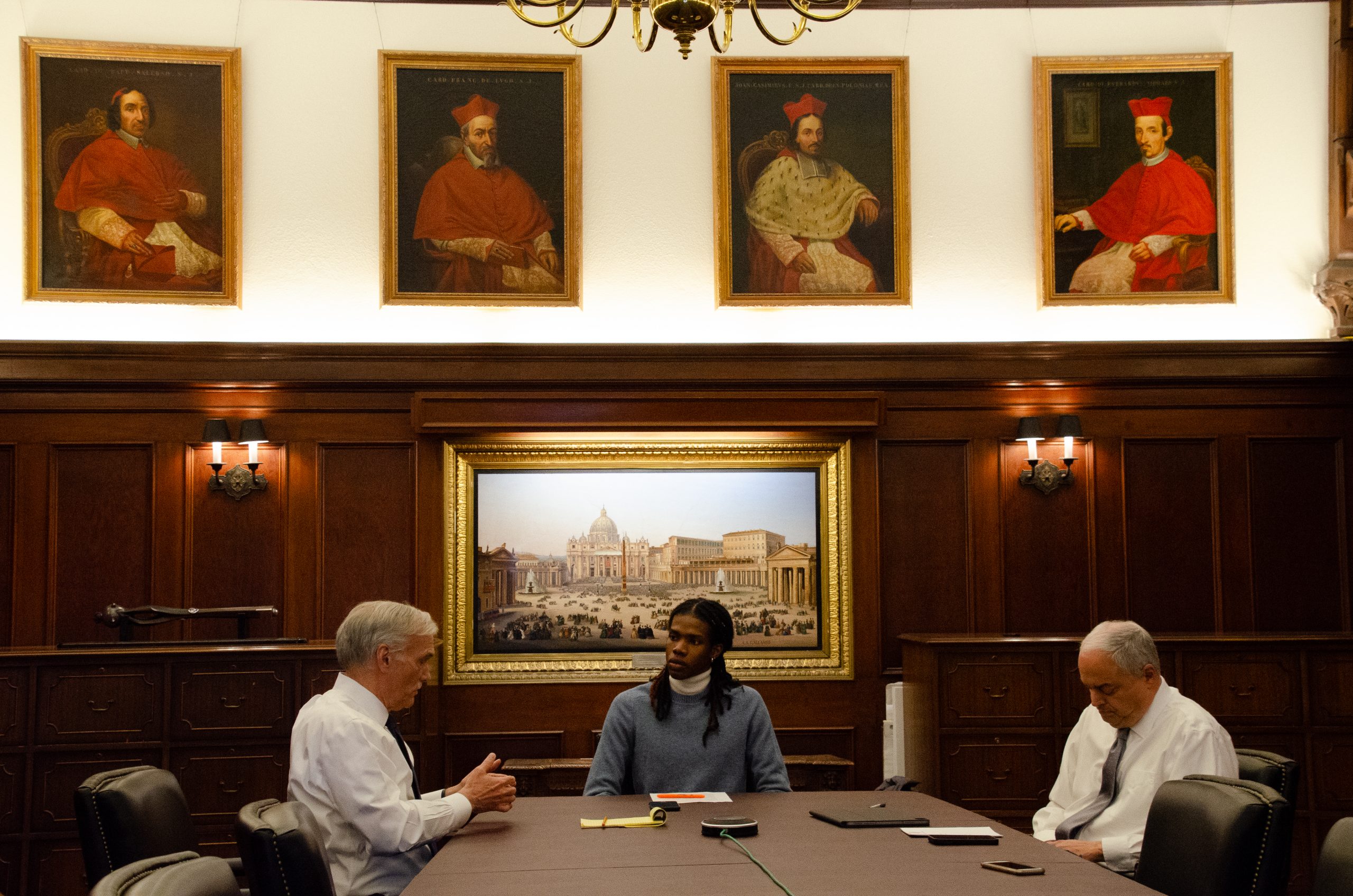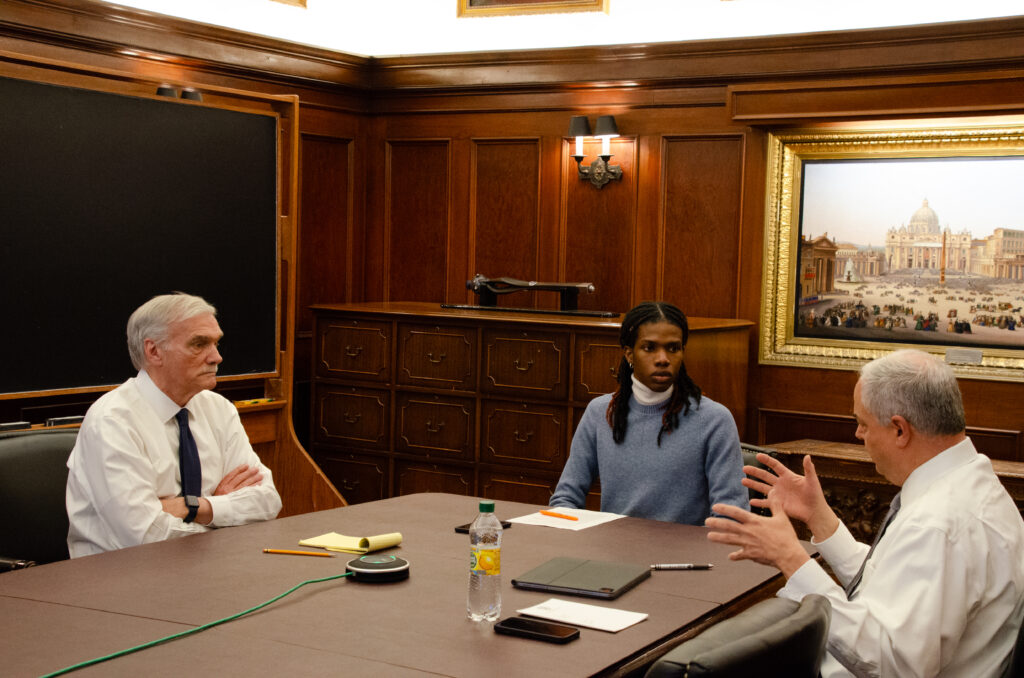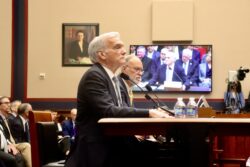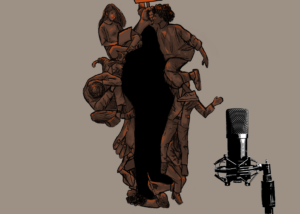For the past few years, the Voice has aimed to have a semesterly sit-down interview between the editor-in-chief (EIC) and the current sitting president of the university. As the outgoing EIC from the fall semester, I got the chance to sit down with Interim President Groves and Senior Vice President and Chief of Staff Joe Ferrara to talk about some of the biggest issues currently facing the university and its community members.
This interview was conducted on Jan. 16. In 30 minutes, we were able to cover topics including the ongoing presidential search, legacy admissions, ongoing litigation against Georgetown and more.
Here are some highlights before the full transcript:
- Interim President Groves described President Emeritus DeGioia’s health recovery and decision to step down from his position as President.
- The Board of the university is working on building a search committee for a new president, and Interim President Groves explained that there will be mechanisms for input on the process from Georgetown students and community members.
- Given that acceptances for students from underrepresented minority groups declined this year, Interim President Groves explained some of the University’s attempts to maintain diversity in admissions.
- The University currently has no concrete plans to bring an end to end legacy admissions; however, Interim President Groves and Vice President Ferrara shared that they have been in conversation with student organizers about the issue.
- Interim President Groves and Vice President Ferrara also spoke about their commitment to maintaining protections for immigrant and undocumented community members at Georgetown going into the next presidential administration.
The following interview has been edited for length and clarity.
Leadership transitions after President DeGioia’s stroke
Ajani Jones (AJ): It’s been awhile since an editor-in-chief of the Voice has been able to meet with anybody serving in an executive position at Georgetown. So we wanted to start by asking, how do you both feel that Georgetown has been doing over this past year?
Robert Groves (RG): Maybe we should start with why I’m here. And that goes to Jack’s stroke, President DeGioia’s stroke. And I think it would be good for Joe to describe how we started working together. That would be a fuller answer to your question.
Joe Ferrara (JF): Yeah, basically—thank you for the question. This has been a challenging time. Jack, President DeGioia was president of Georgetown, as you know, for 23 years. And it was quite a shock when he had the stroke back in June. We had never dealt with something like that before, and we had to sort of swing into action and figure out how we were going to handle this.
It became clear fairly early on that he had suffered a major stroke, and it was going to take some time for him to recover. Bylaws of the university say the provost shall act in the absence of the president. And so Bob, of course, was the provost at that time. Now he’s the interim president.
RG: So we started working together on June 6th, really.
JF: Exactly.
RG: It was immediate.
JF: The very next day, we started sitting right here in this room, Bob and I and a few other senior administrators, and worked very closely with the board. The board created a special committee, to help us sort of guide through this time. Again, it was unprecedented.
We hadn’t had something like this happen. And coupled with President DeGioia’s long tenure—I think we wanted to be very careful to do the right thing for Georgetown, keep his initiatives going, keep the university together. So it’s been a challenging time. President DeGioia ultimately made the very difficult decision to resign, to step down from the presidency.
He’s now, the board has designated him president emeritus. And his recovery is continuing. He is out of the hospital. But this is a long recovery and he still has a ways to go. His prognosis is good, but, getting back from a major stroke like this takes some time. So Bob and I are focused on doing everything we can to just keep the university going as we prepare for a search for a new permanent president.
RG: And then to answer your question is as soon as the interim president was appointed, me, that allowed us to appoint an interim provost. So we had Colbert (Soyica D. Colbert, Interim Provost) and, so we have in place all of the senior leadership going forward. And, since, as you got an email announcing the presidential search, right?
So, we think it’s a moment where we work together as a community in ways that are even stronger than we’re used to because we want to make sure everyone—and we welcome this interview—everyone understands what we’re going through and the fact that there’ll be a presidential search and, there’s work to be done, initiatives to keep going. But also, the care for the community is never more important than it is now because of the uncertainty.
That’s a great question. Thank you. Thank you for that.
AJ: You answered a bit of this, but I wanted to also ask directly if you can answer this. What led President Emeritus DeGioia to make that very difficult decision, as you said, in November to step down?
JF: I had an opportunity to be with President DeGioia and his wife, Theresa, several times in the run up to that decision as someone who had worked with Jack for 13 years in this office. It was a very, very difficult decision. I think ultimately what led to the decision to step down was two things.
One is a realization that he really needed to focus on his recovery, and it was going to be better for him and the family if he could just focus on that, and not put Georgetown out of his mind—because he will be president emeritus—but spend all of his energy focusing on the recovery.
And I think the second thing was, Jack is, always has been, dedicated to Georgetown, and he felt that was in the best interest of Georgetown for him to step down, so that the university could keep moving. And that’s ultimately what it was. I think when they got out of the hospital that helped. They were out of the hospital environment. They were back home. They were able to think through this. And it was a difficult decision, but I think they felt this was the best thing, not only for him and the family, but for the university.
RG: And the months of rehabilitation therapy that was going on was necessary to get a sense of what the future was. It was hard to make this decision quickly after that, because it wasn’t clear how things would progress. But as the rehabilitation process generated the data of his advancement, then a rational decision could be made—much more physician-guided, evidence-based.
JF: It takes a while at first when you’re recovering from a stroke, as I’ve learned—I’ve learned a lot about strokes in the last six months—to start to get a sense of ‘what is the road map? How long is this going to take?’ And even the doctors don’t know right away. So there was some time that was needed before they could even have the information to make a decision. But, ultimately, as you know, they made the decision right before Thanksgiving.
AJ: Thank you for sharing that. We really appreciate that.
You also mentioned the committee that was put together to help in the search for the new permanent president of the university. We wanted to ask: what can you share about the criteria being taken into consideration during this search? How, if at all, do you plan to integrate the voices of current and former Georgetown students, faculty, and other community members into this search process?
RG: This is a great question, and in fact, your article could help achieve, I think, what everyone wants to occur. So first of all, it’s very important for all of us to realize that this is the one action that is totally the Board [of Director]’s responsibility. We can have opinions but the board or the fiduciaries of the institution, it’s their responsibility to do this.
Having said that, the Board is deeply respectful of different voices. The third thing to note is that search committees at the presidential level have become smaller than, say, the dean-level searches—we have dean-level searches going on. So automatically you can deduce, ‘gee, not everybody can be represented in a small committee.’
So what’s the antidote to that? What do you do if you want input from a lot of stakeholders? Over the next few days, the search committee will announce efforts to get input from everyone, students included. So there’ll be listening sessions where students will be involved.
There’ll be a website where if you want to send messages to the search firm about what you think the next president should be or how things should be organized. That’ll be open and it’s through those devices we’re hoping that students will feel that, ‘Yeah, I got my voice heard through the process,’ and we’re very serious about that because it’s not just students. There are other groups that you can’t just fit into a 12 person committee, and their voices need to be heard.
JF: And that includes, as you mentioned, former alumni and staff and faculty—we want to make sure the largest possible group within the Georgetown community has an opportunity. The Board wants that. They want to be able to hear from everybody.
RG: So a request to you would be when these things get laid out that anything you could do as a voice, no pun intended, to urge students to participate, you know, now’s your chance. And that would be a wonderful service to the community if you could do that.
AJ: Like you said, we think students and faculty and other Georgetown community members are very important in this process. So we’ll definitely see what we can do.
Diversity in admissions
AJ: Moving on to our next question. So, following the class of 2028 admission cycle and the demographics of the admitted class, which were later published, Georgetown has seen a noticeable decrease in its number of admitted underrepresented minority students, especially among its Black and Hispanic student populations.
What was done to ensure that these figures will not continue to decrease for the incoming class of 2029? And how does the university plan to continue to improve its admissions processes for future admissions cycles?
RG: Great question. It’s something that we talk about almost every day. So let me do a slight clarification or a slight embellishment of what you said. It starts from a Supreme Court ruling that race cannot be used as an explicit criterion. And so, for the very first year, we ran an undergraduate and graduate admissions cycle where the race of the candidate was unknown through the checkbox anyway.
So, how do we achieve our diversity goals with that absent? On the undergraduate side, you are indeed correct. We had 30% fewer acceptances among African American applicants than we did in the prior year. However, the number of enrolleds was only like four students different. That was a wonderful win on our part, relative to our peers.
So how did we do that, you might ask, as we asked immediately. It looks like there are two things. One, our efforts once we have an accepted African American applicant to reach out and convey that they might be happy here. They would have a sense of belonging here. We’re a place that is open to people who look like them and people with their background.
GSP and CSP are big selling points on that, and we exploit that as much as we can. Secondly, and this is kind of a one year event. You may recall that the FAFSA Form—the electronic one that the federal government supplied—wasn’t operating the way everyone wanted. And so schools got delayed information. Many schools, many of our peers, if you were accepted, you got a letter that said, ‘Congratulations, you’re accepted, and we’ll give you your financial aid package as soon as we have data.’ We didn’t do that. We packaged a financial aid offer based on data from the SAT and the College Board. And we gave full financial aid packages.
I’m convinced that was a win for us. And then we did one other thing that’s very important, and that is for Pell-eligible students. For the very first time, we transferred from the financial aid office to the admissions office that one attribute: is this applicant Pell eligible? And we increased the proportion of Pell eligibles from 8% to 15% in one year. We’re going to keep doing that. Now, race is not equivalent to income. We know that. It helps a little. It certainly helps us on our goals of diversity and socioeconomic status. Did I address your question?
AJ: I believe so. Well, you kind of did, but just how do you plan on continuing these efforts in future admissions cycles?
RG: We’re looking at a variety of things. We are towards the end of about a two year process of deep examinations—I’m sort of a data geek—deep examinations of what we’ve done over the last five to 10 years. Can we improve those? What seems to work for different groups? And over the coming months, I think we’ll be able to supercharge that as much as possible.
We must comply with the law, but our goals on assembling a set of students who have diverse life experiences has never been stronger. We’re not giving up, that’s part of our mission. That’s not an optional thing. The world has changed. We have to do it in a different way, but we’re going to keep doing it.
AJ: Thank you for that.
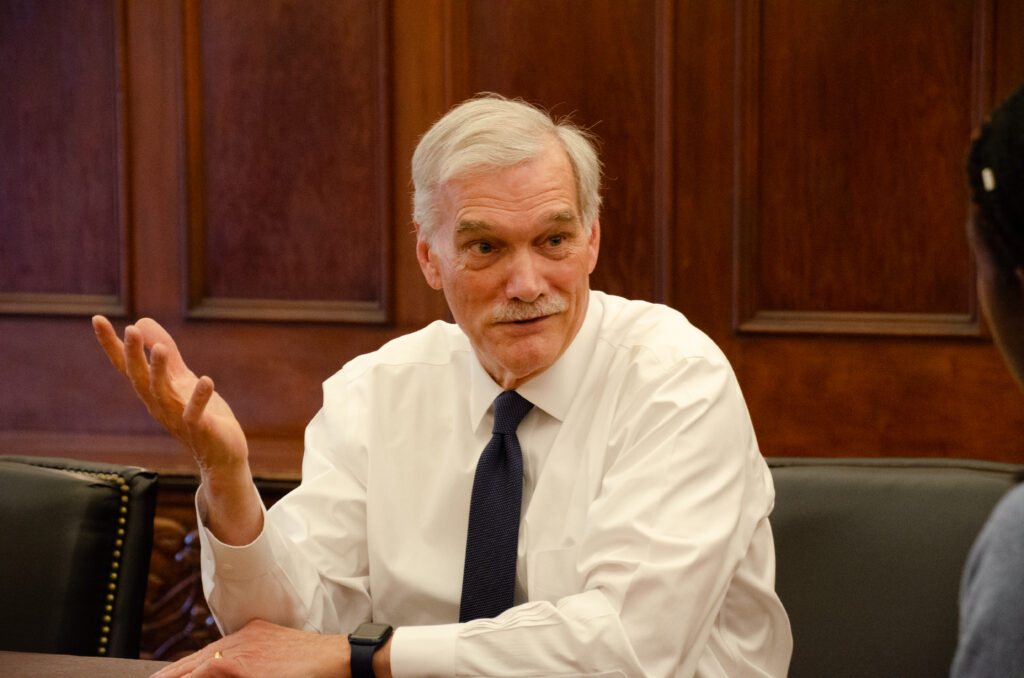 Photo by Sabrina Shaffer
Photo by Sabrina Shaffer
Legacy admissions
AJ: Okay, so I guess moving on to my next question. So, in a similar admissions vein, this has been an ongoing topic for many years now, I believe, but, we wanted to ask, does the university plan to bring an end to legacy preferential admissions? And what is—well, actually, I’ll break this question up into two parts then. So just that first part, does the university currently have plans to bring an end to legacy preferential admissions?
RG: So first of all, there’s thanks to be given to a set of students who’ve become active on this and very thoughtfully, you know, forwarded this.
JF: We’ve met, we’ve met with those students several times.
RG: Yeah. What we’ve inferred from those meetings, and you could elaborate on this, is that we have deeply shared goals, and that is that access to Georgetown is a function of your academic prowess, whatever your background is, and that ought to be as fairly distributed as possible and that socioeconomic diversity, especially for that group, loomed very large in their concerns and we respect that. And maybe you should relate the last meeting.
JF: Well, we have met several times with the student leaders who’ve been leading the legacy petitions and, as Bob said, I think one thing that was clear in our meetings was there was this shared goal of the greatest possible socioeconomic diversity. In part, their positions and other critics of legacy, their position is this is thwarting, this is suppressing socioeconomic diversity. What we shared was our work on increasing the number of Pell-eligible students and some of the tweaks we made to the admissions process to be able to attract, recruit, and enroll more of those students, which paid off in a big way this year, as Bob said.
The point we were trying to make was the admissions process, putting together a class of 1600 incoming undergraduates is really a process of construction and composure. You know, the number of things, the number of factors to include socioeconomic diversity, but we’re looking for pre-med students. We’re looking for athletes. We’re looking for students who are interested in music and on and on and on and on. Geographical diversity. We want students from Ukraine and Gaza and we want students from Wyoming. You have to step back and look at that larger picture of how we’re trying to put together 1600 incoming first years.
But we have found some tools, such as what we did this year, that we think are pretty effective at increasing socioeconomic diversity. So we have been paying attention to this. We are continuing to look, as Bob said, at kind of the full array of the admissions ecosystem to include legacy.
We haven’t landed on a decision yet, but we are continuing to engage in review of this as part of our larger review, all of which started, as Bob said, with the Supreme Court decision. That’s when we really realized we’ve got to sit down and look at how we’re doing admissions. There was also some turbulence during the COVID period that made us realize this was a good time to take stock of how we’re doing admissions, but with socioeconomic diversity as a key guiding star
RG: And in that move that we made that brought us from 8 percent to 15 percent is an unprecedented one-year jump. Nothing we had done before had produced those kinds of results. So we’re on to something now, and we’re going to keep doing that. And then there’s one other thing that’s important for all the students to know. We’re in a fundraising campaign. One of the key pillars of the campaign is scholarship to increase support for students who need financial aid and our alumni and donors are totally supportive of this mission that we have of diversity and variation on socioeconomic status.
AJ: Thank you for that. So again, in a similar vein, we also wanted to ask what is your initial response to the ongoing lawsuit accusing Georgetown, among other schools, of allegedly naming specific wealthy or legacy prospective students for preferential admission?
JF: I can say a couple things, whenever we’re in a situation where there’s active litigation we’re always told by counsel there’s only so much we can say and we don’t want to be in a position of commenting on active litigation. But I would say this.
We strongly disagree with the plaintiff’s arguments. We think Georgetown has behaved responsibly in our admissions practices. President DeGioia participated in any number of forums over the years, all of which were focused on enhancing affordability and access. So anything that Georgetown ever did and that President DeGioia ever did—and I’m talking about Jack now because this lawsuit is kind of looking retrospectively at times where he was president—anything he ever did or that Georgetown ever did in this was always about, ‘How do we create the best possible, the most diverse possible class at Georgetown?’ So we just strongly disagree, we disagree with what the plaintiffs are arguing that we were somehow in collusion. And that’s why we’re fighting this thing.
And so I can say that to you. We are fighting this and we just disagree with their arguments.
AJ: Thank you for that.
Preparing Georgetown for the Trump Administration
AJ: So broadening scope just a little bit, but still focusing on Georgetown. Following the results of the U.S. general election last fall, many community members of Georgetown have expressed worry regarding President Trump’s initiatives to take effect early in his presidency, including growing anti-immigrant sentiment being pushed by the president and many of his key advisers. During Trump’s last term, Georgetown did take a stance on protecting its international and undocumented community members. Are there currently any plans to continue these efforts during Trump’s second term? And how does Georgetown plan to work with its international and undocumented community members to ensure their safety?
JF: Let me jump in on that Ajani. First of all, we will always do everything we can to protect our students, to protect our community period. No matter who’s president, we will always do that. And we, with the new administration coming in, we have been actively reviewing from the campaign what are the things that the campaign said they would do if they came into office. I will say we do this with whoever gets elected president. When Joe Biden was elected president, we looked back and said, what did Biden say he was going to do that affected higher ed and that could affect Georgetown.
Now that Donald Trump has been elected again, we’re doing it again. We have a lot of practices in place from the last time we were dealing with what we felt were threats to undocumented students or students in other kinds of fragile statuses and immigration. And we have not lost some of that, you know, for example, we continue to have a relationship with Catholic charities to provide free legal advice to undocumented students. We didn’t drop that. We still have that. So we are taking a very hard look at the full range of things that were mentioned in the campaign that the administration that, if we take them at their word, they may try to do and we will be guided by our Jesuit values. We will be guided by our commitment to protect and support our community.
And so that’s what we’re doing. There’s a long list of things that were said in the campaign. Some of them relate to the immigration issue and some of those are some that really could potentially affect our community directly. So we’re doing a lot of focus on that. In fact, we’re having another meeting tomorrow to talk through some of these issues. So, that’s what I want to leave you with is we’re very focused on this.
RG: Yeah. Let me supplement one thing. You know, for many of your readers, this is the first transition they’ve gone through right? Or that they were engaged in. But this office is engaged in it every four years, almost. So what’s being done is routine at the change of administration. We have to make sure that we are aware of the external environment that might affect Georgetown or higher education and that we navigate how we can continue our mission even if the external world varies somewhat. That’s a great question.
Looking forward
AJ: Thank you. Okay, so there are a lot of issues and a lot of these questions require a lot more time than we currently have for you to give a thoughtful answer. So I wanted to end by asking, is there anything else you wish we’d asked or anything you’d like to add, especially considering some of the other questions we did have planned out?
RG: Well, you’re in a very powerful position as a journalist, right? In a time where information is important. We are committed to making sure everybody has answers during this period of transition and that people have answers to what’s going on. And it’s an important moment that the community stays together.
And, our hope is that in summer of ’26, a new president arrives—And I guess you may not be here then. Hopefully you’re not here then—and that the students are indeed part of welcoming a president that they say, ‘Gee, this is a perfect choice for students at research universities.’ That’s our hope. That’s what we’re trying to do. That’s our job to get ready for that.
JF: And we think Georgetown has a lot of strengths, but we can always get better. And a lot of your questions get at the things where we’re trying to get better and do better. We don’t ever want to be complacent that somehow we figured out everything. We always want to be striving to do better and so we appreciate the opportunities to have these discussions because engaging with students and engaging with student journalists helps us to understand what are the issues that are on people’s minds. What are people talking about? What are people concerned about? So this is very helpful to us.
AJ: Thank you so much.


